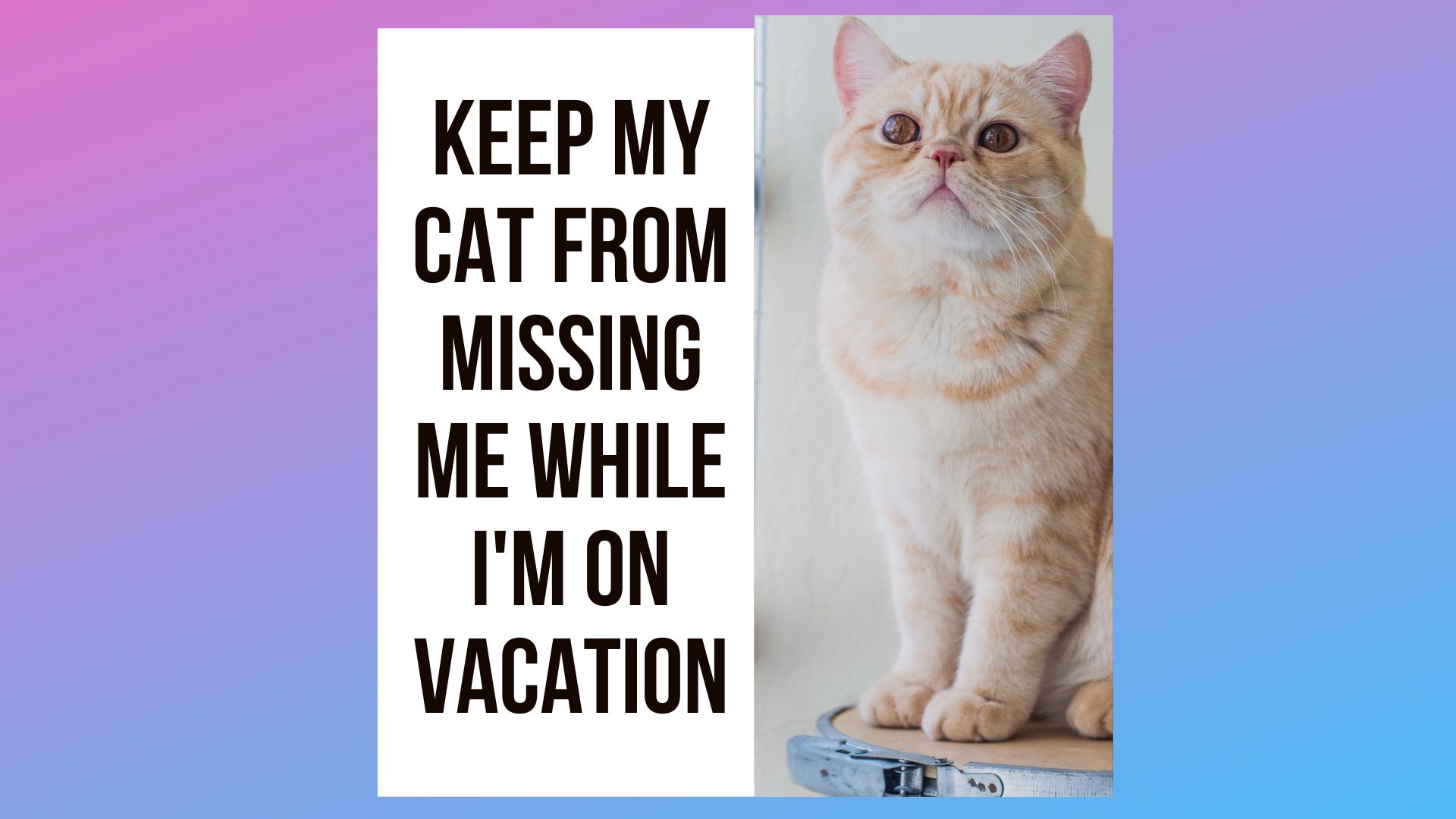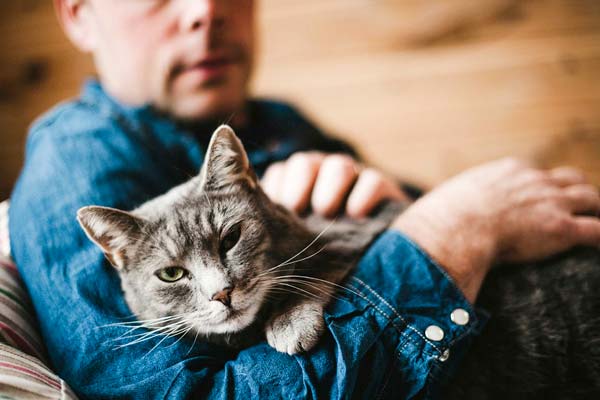
Do cats miss their owners when they go on vacation? Will my cat does not like me if I go on vacation?
Whether a vacation or work-related trip, sometimes you have to be away from home and your cat. Owners might assume their feline will be fine and won’t notice their absence if they make sure they have access to food and water.
Are they right?
No, they’re wrong. Even aloof cats that pretend you don’t exist will know when you’re not home. Social kitties will feel your absence more, and it could have a larger impact on their stress levels.
Cats require security. A major part of that is you and their routine. This can lead felines to act out when you leave for hours or days, depending on the cat’s personality.
Research says cats don’t miss their owners nearly as much as dogs do, but maybe your kitty missed that memo.
Do Cats Have Separation Anxiety?
According to Jackson Galaxy from My Cat From Hell says anytime you or something else disturbs their routine, they can experience stress or anxiety.
Need more proof? Yes, they certainly can have anxiety when you leave for long or short periods or their schedule changes, according to Vet Info. This causes them to act out in various ways as if they’re crying out for help.
Separation and general feline anxiety could be more prominent in shelter cats. They can have unknown histories, or their previous owners might have dumped them.
In its severest form, your cat could have PTSD. Having you leave could spark something in them that makes them believe you’re not coming back and lead to stress-related behavioral issues.
The Most Common Symptoms of Feline Anxiety
- Pooping or peeing outside the litter box
- Caterwauling
- Destruction
- Vomiting
- Withdrawal
Cats can take days or weeks before they adjust to changes in their routine. Their symptoms and behavioral issues can persist after they seem to be their normal selves too.
However, sometimes the signs can be subtle. Understanding your cat’s mojo, as Jackson Galaxy calls it, can really help you understand your cat and notice the slightest cues of its stress.
How Do You Treat Feline Anxiety?
Your vet will diagnose your cat, and they should be your first stop. Separation anxiety has symptoms that mimic other conditions, as the vet in the next video highlights.
Cats can only communicate their distress and pain in so many ways. Even if you believe nothing else could be the cause, take your feline to the vet. A vet trip can rule out the serious ones that require immediate medical attention.
Behavior modification is a popular therapy, which can include modifying your routine too. In severe cases, your vet might recommend prescription medication for severe cases or over-the-counter anti-stress sprays, herbs, or treats.
You shouldn’t ignore your vet’s advice or worry about blame. Focus on calming your kitty. It’s a process, and it could take weeks before your cat is back to its old self.

Your Cat Has Never Shown Signs of Separation Anxiety Until You Left for Vacation. What Do You Do Now?
You were enjoying sunny beaches when your pet sitter called and said your lovable, perfect cat peed all over the house and destroyed your sofa.
There is little you can do until you are home again, but whoever you’ve entrusted your cat’s care to should take them to a vet. Again, you want to rule out medical problems immediately.
In the meantime, your cat’s caregiver can provide extra play and affection. It might not be enough, but as long as the cat isn’t acting out violently, it can’t hurt.
It can take days or weeks after you return for your cat to re-establish a routine. You should be patient and confident as your kitty readjusts.
You Went on Vacation but You Believe Your Cat is Different Now That You’re Home
This can occur with a long vacation when your cat’s needs weren’t met. Remember, cats require more than food, water, and a clean litter pan to feel safe and secure.
Seeing another person while you’re gone can assist with human interaction. That person should pet and play with your cat and attempt to maintain the schedule your cat knows.
Failure to do that can leave your kitty stressed out and distrustful of you when you return. It can also cause them to act out in your absence, destroying items or harming people. The negative behavior could continue on your return.
Should You Take Your Cat with You When You Travel?
You and your vet will be the best judge over your cat’s personality and ability to travel. Unless your cat is naturally calm and it’s allowed, you should leave your cat at home in the environment it knows.
Your cat could become just as stressed out. Cooped up in a hotel room all day isn’t a vacation for your cat. The only good part about it is they will have you, but you’ll still disrupt their routine and surroundings.
This doesn’t include the additional stress of traveling, such as flying or car rides. We only recommend taking your cat for domestic travel unless you’ll be abroad for months or moving.
Foreign countries have different laws, procedures, requirements from you, and quarantine restrictions.
If you do take your feline with you, make sure you book a pet-friendly hotel early and arrange your method of transportation.
Flights can be extremely stressful for cats, and you’ll need to learn your airline’s domestic and foreign pet policies and adhere to them.
You Can’t Take Your Cat With You, but You Don’t Want to Stress Out Your Cat
You have many options to ensure your kitty is well taken care of and exposed to as little stress as possible while you’re gone.
None of them can guarantee your cat will not develop separation anxiety. You’ll find with kitties, in general, there are no promises.
The video above highlights different ways you can help your kitty have a low-stress experience while you’re away.
Consider Boarding Your Cat
Boarding in a licensed facility that specializes in cats is ideal. While the idea of confining your feline to a cage might seem like punishment, it’s not. It could be the best solution for both you and your kitty.
Vet offices and specialty borders provide consistent care, including feeding, socialization, and play. They monitor your cat for signs of stress, illness, or injury too.
Choosing to the board does require work and research if your vet or local shelter doesn’t provide the service. Be sure to thoroughly check references and visit the facility.
Have a Family Member or Friend Your Cat Knows and Trusts Stay Over
Trust is a big deal to your cat. If a family member or friend can become your cat’s surrogate cat mom or dad while you’re away, you should have little to no issues.
Having the person stay and adapt your routine is the best for your cat.
However, this isn’t always possible since your family or friends have their own lives. They should try to adhere to your schedule as much as possible with feeding and cleaning their litter box. Playtime is important too and shouldn’t be skipped.
Your family member or friend should arrive a week or days before your leave. This provides ample time for your cat to adjust to their presence if needed. Have them take over the duties prior to you actually leaving.
Hire a Professional Pet Sitter
You want a fully insured individual or company. This ensures you’re both protected should an accident occur. Seek a professional that is part of the International Boarding and Pet Services Association (IBPSA) if possible.
Consider placing a nanny cam in your cat’s social areas as we suggested above. This allows you to check in on your feline’s wellbeing. You can then communicate changes or suggestions to your sitter to better the experience for your cat.
Our Final Thoughts on Keeping Your Cat From Missing You While You’re on Vacation
Being a cat mommy or daddy doesn’t mean you can’t take a vacation or business trip. However, cats and their behavior go hand in hand with their sense of security and routine. Sometimes this can cause adverse behavior and stress.
To counteract potential problems, consider alternatives to leaving your cat completely alone. Provide their basic needs by taking them with you, having a family member or friend stay at your home, using a boarding service, or hiring a professional.
These steps can bridge the gaps in your absence. Your cat might still miss you, don’t get us wrong, but they’ll be healthier and happier until you come home.

Hi, This is Alexa, and I love cats. This Website is a Complete Journal about how to travel with a cat and other information about Cat Health, Cat Training, Cat Behavior, Cat Foods and more. I hope you find it useful.
